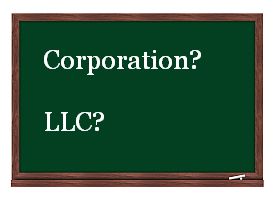Corporation v. LLC
Tax structure, capitalization, and liability are the most important factors when determining the best choice of legal structure for your business operation. It’s improper to suggest that one form is better than another; rather it’s generally important that you have an idea of some of the pros and cons of the two foremost choices.
The corporation was the original goliath of legal entities. Under the law, a corporation is treated as an individual; meaning it can enter into contracts, take out loans, and pay taxes apart from its owners (the shareholders). It is run by Directors, and managed by Officers. Ownership is easily transferable, and the corporation and will exist perpetually until formally dissolved under the law, regardless of whether it’s owners change or pass away. They offer limited liability but at a price. Because the corporation must pay taxes as an individual, its owners are subject to a second, “double” taxation on their personal profits and income. Depending on your capital structure and profit margins, this may be miniscule, but if you’re a very large company making around $1 million in profits annually, this can mean the loss of a $200,000 distribution.
The LLC offers a hybrid form of legal structure between the corporation and a partnership. It offers limited liability without the double taxation. All profits and losses of the company are “passed-through” to its members. Also, the flexibility of the LLC form allows its members to contract freely for distribution, management, voting, and profit sharing rights, without the need for formal meetings, minutes, or other corporate filings.
An LLC however, is not as appealing as a C-Corporation to venture capitalists or institutional investors, who don’t usually invest in pass-through entities like LLCs or S-Corporations. It’s also difficult and more taxing to split shares and sell stock in an LLC. If you’re seriously considering an LLC or corporate form, it’s also important to consult with a tax specialist or accountant who can help you evaluate whether the tax savings of an LLC are substantial enough to outweigh the formalities and implications of a corporation, although a good lawyer can give you a reasonable estimate.





